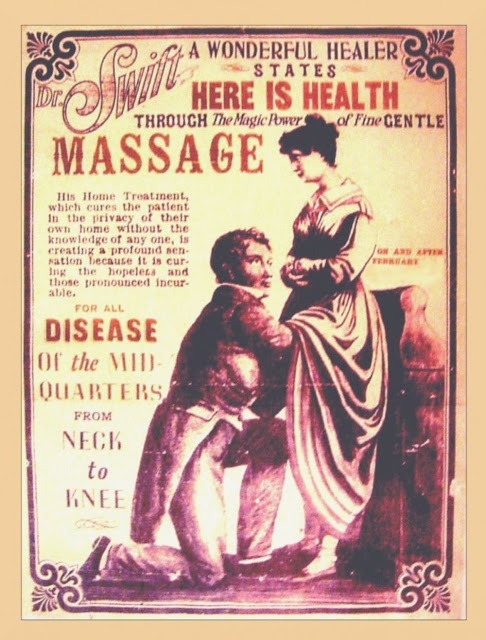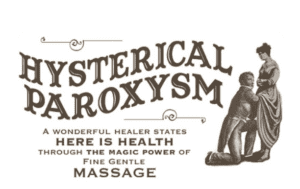Hysteria
This is an adapted excerpt from my upcoming book–not the good and juicy stuff (that’s for the final publication). But a snippet about being gaslit for years by doctors—and how it is not uncommon.
Gaslight is a good movie, but being gaslit is not so great when it happens to you
I was in the back of an Uber on the way to a doctor’s appointment, wondering if I was hemorrhaging to death.
It was March 31, 2022 and I was having what I call a “crime scene” period.
I hoped this doctor would be different.
For the past 7 years I had sought healthcare advice and was dismissed, admonished, and shamed. (That is, if I was listened to at all).
Here’s a little sampling of things I was told:
You should just wait it out until menopause,” said one doctor.
“This is normal for your age,” said another.
“Women gain weight in their forties…you can’t possibly expect to look the same as when you were 20.”
“Are you sure the clots are bigger than a quarter? It’s very unusual for them to be bigger.”
“Do you think you might be exaggerating a bit? Perhaps a prescription for anti-anxiety might help.”
The term for all this is gaslighting.
It stems from a 1938 play; “Gas Light,” (which was then adapted into a movie in 1944 called “Gaslight”). The summary is a woman is made to feel crazy when the gas lights are being dimmed in her house each day (but she is told they are not).
Gaslighting in women’s health is no secret; up to 72% of women report being gaslit by healthcare professionals.
Even when women have the same symptoms as men– they are more likely to be told it is in their head. (Oladele, et. Al., 2022).
There’s actually a medical term for women complaining about medical issues: it is called “Hysteria.”
Hysteria as a diagnosis wasn’t removed from the Diagnostic and Statistical Manual of Mental Disorders (DSM) until 1980.
I was born into a world where women could still be locked up by their husbands for hysteria, which was really just a term for “misbehaving.”


It’s definitely you, not me
Hystera, Hysteria, & Hysterectomies


Hippocrates started it all
It’s not lost on me that the greek word for Uterus is “Hystera.”
According to Sigerist HE. A history of medicine. Primitive and archaic medicine, Hippocrates was the first to diagnose female issues with the term Hysteria in the 5th century BC.
5th Century BC. <–!!.
Hippocrates, otherwise known as the father of medicine, believed the root cause of “crazy” (aka complaining) ladies was due to the uterus migrating around the body. He called it the “Wandering Womb.”
I’m all for his beliefs such as “Let thy food be thy medicine,” but I draw the line at wandering wombs.
The cure for Hysteria included, amongst other things, penetration. In fact, the vibrator was invented to cure hysteria, and in the Victorian Era (late 1800s to early 1900s) doctors would finger women to induce “hysterical paroxysm” or an orgasm.
Be gone, uterus!
It’s all well and good to finger a patient, but it gets worse. Doctors decided that if the issue was a wandering uterus, the best solution would be to just remove the uterus. In 1843, Dr. Charles Clay performed the first abdominal hysterectomy (the surgery to remove the uterus through an abdominal incision).
His patient died.
I discovered this shit has been going on a long time.
“Vaginal hysterectomy dates back to ancient times. The procedure was performed by Soranus of Ephesus 120 years after the birth of Christ, and the many reports of its use in the middle ages were nearly always for the extirpation of an inverted uterus and the patients rarely survived. The early hysterectomies were fraught with hazard and the patients usually died of haemorrhage, peritonitis, and exhaustion. Early procedures were performed without anaesthesia with a mortality of about 70%, mainly due to sepsis from leaving a long ligature to encourage the drainage of pus.” From, “Hysterectomy: a historical perspective”; C Sutton.
Re-read some of that. Performed without anesthesia. “Rarely survived,” sepsis.






Last I checked it was not the 5th century
Hysteria =hysterectomy?


A 45% chance of losing your uterus
When you look at the history of hysterectomies it seems almost….nefarious? Barbaric?
A woman has a 45% chance of a hysterectomy in her lifetime according to the National Institute of Health.
According to Johns Hopkins, “About half a million hysterectomies are performed each year in the U.S. It is the second most common surgical procedure for women, after cesarean delivery (C-section). Most hysterectomies are performed between the ages of 40 and 50.”
As you enter perimenopause, the often 10-year rollercoaster toward menopause, doctors are more likely to recommend a hysterectomy for any uterine issue, whether it’s heavy bleeding or pain, pcos, endometriosis, fibroids–you name it. It’s the blanket “cure.”
Yet, 90% of hysterectomies performed each year are not necessary.
Why are healthcare professionals ignoring women until their symptoms get so bad they need a hysterectomy?
So, let’s go back to my doctor’s appointment
(Before I start, I want you to know this excerpt is a VERY condensed and re-written excerpt of one chapter because I do not trust AI to not steal my book in progress. ;))
I somehow made it into the bathroom of my doctor’s office before a crime scene, reminiscent of Dexter, occurred. This time around, my symptoms could not be ignored.
15 minutes later I was getting an ultrasound.
An hour later I was being asked to sign papers to remove my uterus for an emergency surgery. I refused (more on that in the book!) and asked if there was any other solution.
10 hours later I woke up from general anesthesia (uterus in tact).
Apparently there had been another solution.
The only reason I woke up with my uterus is because I felt empowered: the ultrasound validated everything I had been complaining about. I questioned my doctor and advocated for my needs.
At long last I had proof that something HAD been wrong, for all those years. I was not crazy or suffering from hysteria.
I was just a middle aged woman who had been put into a box, gaslit, and dismissed. I had fibroids, something 75% of women over 40 have.
My experience was the catalyst to write my upcoming non-fiction book. My mission is to provide other women with the courage and education to make choices that are right for them–and to trust themselves.
Trust yourself! Let me know in the comments if you’re had a similar experience being gaslit, and having to advocate for yourself.
Editing to add (after Hunter’s comment and my thinking about this)– a hysterectomy may very well be the right solution for you.
But I will always advocate for knowing our options. We are empowered when we have information!



Intrigued?
That’s a snippet from my upcoming book.
If you’re interested in being quoted, or want to know more:



I am testing this out but I hope anyone who has feedback lets me know!!
This was such a captivating read – as someone who went through pregnancy and had that be their first interaction with medicine other than routine care….I really understand how being a female patient lends itself to symptoms being downplayed. I’m thankful you are writing about this. Cant wait for more.
xo
Aziza
Thank you so much Aziza! Yep gaslighting is real. 🙂
I’m a man here, curious about the pros/cons of getting a hysterectomy because guess what, I’m a man with a uterus…WHAT?! Yes, I’m a very happy, healthy trans man, however, two weeks ago insurance DENIED my request for a gender-affirming hysterectomy so I am very curious what my body has in store for me as I’m taking weekly testosterone injections. Ten years ago, I had two uterine ablasion surgeries because I was bleeding every day for a YEAR and I actually put up with that. Julie, any advice for “special” me? Thank you! Love your writing btw! Congrats on the book!
Hunter this is a really good question. First-keep fighting your insurance and see if you can get doctors to advocate for you. My second surgery (more on that soon) had to be requested. Sometimes it requires a few letters. If you don’t want a uterus the relief you may feel from having the surgery may outweigh the side effects if you know what I mean. We all should be making choices right for us and not having doctors dictate.
Um, yeah with a year of bleeding. 🙁
Did they check to see if you have fibroids? Because doctors seem to like giving hysterectomies for that. 😉
My research on hysterectomies shows quite a lot of side effects, including lack of sex drive (or no sex drive), rapid aging, anxiety, depression, increased risk of cardiovascular events–you basically hit menopause. A lot is linked to hormone imbalance and then…well one solution is Hormone Replacement Therapy, which I’m guessing you’d require…but the HRT usually needed is high estrogen (I am using Traditional Chinese Medicine instead of HRT to balance perimenopause stuff).
I know many people really happy with hysterectomies.
I would encourage looking up the side effects and weigh the decision based on what you feel in your heart is right. xo
And advocate advocate advocate! I have a chapter called “white coat syndrome” which explains how people get intimidated by doctors and their white coats…and do not speak up for their needs. I called one specialist’s office 17 times. I walked out of another surgeon’s office..I wrote many letters to my insurance. I cannot wait to reveal it all, but the first step is deciding what is right for you and then finding a surgeon who will go to bat for you.
I really enjoyed your newsletter! Thank you for shining a light 💡 on this subject. I think this type of advice, inspiration and support is what middle aged women need today. I look forward to reading your book when it comes out. In the meantime, I will enjoy the brownie bites!
Thank you!!! I agree we need a light shined on all of this :).
What a wild story. It’s amazing how far the medical establishment will go to ignore major health issues in women. And what a warrior that you pushed back on the knee-jerk solution they offered and insisted on having autonomy over your body… it’s so hard to be lucid when you’re in such a vulnerable position. 🙏
Thank you Christi! The story gets even wilder 😉 and I cannot wait to tell it. I love the word warrior hah! Sometimes I forget how vulnerable we can be when we are not feeling well, but I felt empowered by knowing I had actually been right all those years. Thank you for reading! xo
As always, you bravely share your story for all women to benefit, thank you for blazing the trail for the conversation. I had a similar situation with a C-section, they pushed me so hard to have one…I pushed back and had a successful vaginal delivery. It is scary to listen to yourself instead of a doctor…now after reading your article I will be ready if someone recommends a hysterectomy, or any other invasive medical procedure, to me.
Oh wow Beth I had no idea. Thank you for sharing this and for reading (part) of my story. White Coat syndrome is real and it is tough to advocate–I am glad you did! 🙂 I believe we need to know all our options–all of them!!! Before making a decision about surgery. It’s in my book but some of the lifestyle changes actually reduced my symptoms…so if I had started them years before I may very well have avoided surgery. I have a fire under me to get this book out there and help other women!!!!!!!
Finally. Finally. Finally there is light on this subject. Thank you, Julie. Amazing read. I cannot tell you how many healthcare workers just don’t get it. Heck even partners don’t get it – ha! I’m a mom of three littles and let me tell you it’s tough. I cannot wait for more and for the book!!
Thank you so much for reading and believing! We will keep illuminating! Hopefully the next generation doesn’t have to experience this! xo
Very compelling read and I am impressed on many fronts, first and foremost being your courage in sharing your story, one that I’m sure many can relate to and gain empowerment by. Your ability to relate it so intelligently and emotionally sets you apart even further and enables many (including this middle-aged white male/husband) to understand, learn, and move forward.
Steve, thank you so much for reading and your thoughtful comment. I appreciate that sharing this can help so many, including husbands! Information is power and empowerment! 🙂